Hollywood
movies with all their inaccuracies were at least entertaining but
British Cinema, apart from a very few exceptions was pretty dull and
extremely formulaic.
For many years every single actor in England had an upper class
background.
Why this should be so reflects the class distinctions extant
between the wars and up to the 50's.
It was only after this time that working class actors and
actresses started to get parts in British films and prove to be far
more accomplished than their predecessors ever were.
Prior to this you would have some upper-class twit portraying a
toilet-attendant or some such and speaking in Oxford English with a
"h" missed out here and there and that was their idea of
working class.
Even worse than the accent was the fact that any "working
cove" was invariably deemed to be as thick as a brick and
patronised accordingly.
But the real
h owler was always the maid who was
invariably as daft
as a brush and never seemed to have any home life.
Not only that, because they
had never
set eyes on a two up or two- down or been in a semi the screenwriters
assumed that everyone in England had a maid
so you will invariably see feather dusters everywhere in English films
of this era.
And the very worst part of this scenario is that audiences
everywhere watched these mangled distortions of themselves without a
murmur. owler was always the maid who was
invariably as daft
as a brush and never seemed to have any home life.
Not only that, because they
had never
set eyes on a two up or two- down or been in a semi the screenwriters
assumed that everyone in England had a maid
so you will invariably see feather dusters everywhere in English films
of this era.
And the very worst part of this scenario is that audiences
everywhere watched these mangled distortions of themselves without a
murmur.
Another
constant which
runs through these black and whites is the
"boyfriend" of the heroine who is invariably in his forties
or even fifties, sports a flip-brim trilby and is overweight.
His redeeming qualities, if they can be said to be such, are
his upper-class background and his pots of money.
This doesn't say much for the heroine who is usually 30 years
younger than her boyfriend.
Impoverished and from a working class family who speak Oxford
English she plays tennis to keep her spirits up while avoiding the
constant attentions of her creepy beau and is of course as chaste as
the driven snow.
The
classic examples of all of this run through every George Formby film
he ever made and without ever knowing it George opened a window into
just how class ridden England was at that time.
No matter what the setting, the formula was always the same ---
the girl always sees through her boyfriend's evil intent in the nick
of time, returns to her working-class roots in the form of a bumbling
but loveable George and looks toward a golden future of tennis and
chips for the next 40 years.
The
main theme of all these films is of course George's clowning and most
audiences were content to see it on those terms but it is
revelatory at how they accepted the class distinctions as the norm.
Certainly
everyone has their own opinion about what they like and what is good
and what is bad and quite often "good" can be dull whi le
"bad" can be extremely entertaining.
As an example, one of the most stultifyingly boring films ever
made is still
doing the rounds today and generally accepted as a
classic of the British cinema. There
are even people who travel to Carnforth
railway
station where the film was shot and taking geekdom to its ultimate one
or two of them actually re-enact scenes from the film with themselves
as players. Just
how a film mainly set in a drab and depressing railway cafe where they
sold drab and depressing tea and buns and outside was a drab and
depressing rain could ever inspire the dog-like devotion this film
inspires is completely beyond me.
The film is of course Brief Encounter
{ 1945 }
and again brings into focus class distinctions common
at that time.
How the middle- class- but- married doctor Trevor Howard could
fancy the middle- class -but- married Celia Johnson of the
bulging eyes and Olive Oyl figure is beyond me but fancy her he did and audiences
queued for miles for a slice of this suburban angst. Even if she
had been a reincarnation of every femme fatale who ever made a movie
her strangulation of the English language grates like glass on a
blackboard and
I
strongly suspect that most of the ladies who went to see this film did
so to gaze upon the courteous and refined Trevor Howard feeling an
affection for him
something
akin to the way they felt about the family doctor. The
only redeeming feature of this picture that I can see is that the
trains ran on time which is a heartwarming slice of yesteryear but
hardly worth the entrance fee. le
"bad" can be extremely entertaining.
As an example, one of the most stultifyingly boring films ever
made is still
doing the rounds today and generally accepted as a
classic of the British cinema. There
are even people who travel to Carnforth
railway
station where the film was shot and taking geekdom to its ultimate one
or two of them actually re-enact scenes from the film with themselves
as players. Just
how a film mainly set in a drab and depressing railway cafe where they
sold drab and depressing tea and buns and outside was a drab and
depressing rain could ever inspire the dog-like devotion this film
inspires is completely beyond me.
The film is of course Brief Encounter
{ 1945 }
and again brings into focus class distinctions common
at that time.
How the middle- class- but- married doctor Trevor Howard could
fancy the middle- class -but- married Celia Johnson of the
bulging eyes and Olive Oyl figure is beyond me but fancy her he did and audiences
queued for miles for a slice of this suburban angst. Even if she
had been a reincarnation of every femme fatale who ever made a movie
her strangulation of the English language grates like glass on a
blackboard and
I
strongly suspect that most of the ladies who went to see this film did
so to gaze upon the courteous and refined Trevor Howard feeling an
affection for him
something
akin to the way they felt about the family doctor. The
only redeeming feature of this picture that I can see is that the
trains ran on time which is a heartwarming slice of yesteryear but
hardly worth the entrance fee.
The Director David Lean went on to better things as did
Trevor Howard. He was the
complete antithesis of all that his doctor in Brief Encounter
engendered when he played Lord Cardigan in The Charge of The Light
Brigade -irascible, garrulous and lascivious as he led his 600
cavalrymen into the Russian cannon.
Actually, this film portrays the Crimean War in a very
realistic manner, keeping strictly to historical fact and exploring
the dynamics of each relationship faithfully.
Again, class distinctions are very much a part of the film but
in this instance
they are portrayed just as they were in Victorian times with the lines
drawn distinctly and rigidly and the lower classes accepting their lot
placidly as if it had been pre-ordained from on high.
Norman Rossington's portrayal of a dishevelled and weary
cavalryman after the carnage of the Charge has him saying to his
superior " Go again Sir ? " which emphatically illustrates
the relationship between officer and soldier ---a relationship which
carried over into civilian life.
 Apart
from George Formby and Gracie Fields providing some light relief most
of the black and white films in the 30’s and 40’s were serious
stuff. In fact many British films of that era have the strange quality
of being an extension of school lessons as if movies had to justify
their very existence by being educational.
There seemed to be a sense of self-conscious belief that if a
film deviated from some serious theme approved by the establishment
then it was accordingly frivolous and therefore degenerate.
Nobody seemed to notice that it flew in the face of Ars Gratia
Artis or if they did then they didn’t care. Apart
from George Formby and Gracie Fields providing some light relief most
of the black and white films in the 30’s and 40’s were serious
stuff. In fact many British films of that era have the strange quality
of being an extension of school lessons as if movies had to justify
their very existence by being educational.
There seemed to be a sense of self-conscious belief that if a
film deviated from some serious theme approved by the establishment
then it was accordingly frivolous and therefore degenerate.
Nobody seemed to notice that it flew in the face of Ars Gratia
Artis or if they did then they didn’t care.
Goodbye
Mr Chips
{ 1939 } was an
unashamedly sentimental homage to our English way of life epitomised
by the Public School system. Robert
Donat and Greer Garson were outstanding in a film rightly acclaimed as
a classic of the genre. An
unfortunate consequence of Chips was that it was so successful that it
spawned endless numbers of copycat scripts, some good but most very
poor and for a long time it was a case of “Chips with everything”.
Even
as late as 1948 the Boulting Brothers were squeezing the last pips
from the subject with a film
called The Guinea
Pig. The
film began reasonably enough, leaning slightly to the view that class
barriers were coming down and a working class lad at a Public School
was a social experiment worth following.
From that point onward the whole thing degenerated into a
homily on the virtues of cut-glass accents and stiff upper lips and
capital punishment and ended up as an embarrassing Pythonesque re-mix
of “Chips.” Sad to say, Richard Attenborough as the Guinea Pig,
bursting out of his school uniform, sold out to the establishment. One thing that stands out is just how difficult it was at
that time for anyone without a Public School grounding to get to
University no matter how high their ability.
So,
if you weren’t into slapstick and a return to school days did not
appeal then Hitchcock’s adaptation of John Buchan’s
The 39
Steps
{ 1935 } was
perhaps 39 steps more in the right direction.
Robert Donat playing the innocent engineer caught up in a web
of intrigue has charisma and charm in abundance.
Combined with a picaresque and action - packed plot the film
plays well even today. Kenneth
Moore did it again in the 50’s just as successfully and you could
argue forever which is the better version.
One scene in the Kenneth Moore film is hilarious, when on the
run he stumbles through an impromptu speech at a girls school and this
scene alone shades it for me.
Great
Expectations
made in 1946 by David Lean was an excellent adaptation of the Dickens
story with John Mills as Pip
and Jean Simmons as Estella while Moira Shearer did the impossible
managing to make ballet popular with The Red
Shoes.
Not to be outdone, Dirk Bogarde attempted “ a far, far, better thing”
as the degenerate Sydney Carton who famously sacrifices himself in a
final act of redemption on the guillotine in Dicken's A
Tale of Two Cities.
Noel Coward chipped
in
with a patriotic war-time propaganda effort
In Which
We Serve
{ 1942 }
with John Mills to the fore as a chippy cockney sailor and all in all,
cinema audiences of that era must have been the best educated and
patriotic, not to say brain-washed in the whole of the western
world. They were even happy to be shown to their seats.
The
concluding impression I had then and still do, is that for a country
rich in history and event, the British film industry was and is
remarkably insular in choosing both subject and content for its
movies.
It
is fair to say that the films of the 50’s and 60’s echoed the
changing times. Nevertheless,
although grittier and wider in content there was still an overriding
penchant to “give out a message” or explore in depth
some
social scenario -it
seems that they just couldn’t bring themselves to have fun.
The
Bridge on The River Kwai by
David Lean, combined William Holden and Alec Guinness and Jack Hawkins
in an exploration of the effects of life in a Japanese prison camp.
Made in 1957, the film was uncomfortably close to reality and
too soon after the war for many people but it was an excellent study
of a British officer under pressure in an intolerable situation.
Yet another study of an officer under pressure was Tunes
of Glory
{ 1960 }, an
excellent psychological drama where Alec Guinness was never better as the odious
and thick-headed Lt. Colonel Jock Sinclair in charge of a Scottish Regiment.
John Mills plays the new commanding officer, Colonel
Barrow, who Sinclair
resents and despises for his upper-class upbringing.
Sinclair is too stupid to foresee any consequences to his
constant undermining of Colonel Barrow’s position and the situation
leads to tragedy for both men.
Great little movie with two great actors honing their skills in
readiness for greater things.
Another great little movie of this era was the superb adaptation of
Melville's novel, Billy
Budd.
Terence
Stamp excelled as the stammering, young seaman whose life was made a misery by Robert Ryan's Master-at- arms during the Napoleonic Wars.
Nearer
to home, a slimline Albert Finney, a delicious Shirley Anne Field and
a hard-edged Rachel Roberts played out one of the forerunners of
the "angry young man" crop of films in Saturday Night
and Sunday Morning. Albert Finney struck a chord with his
portrayal of a factory-hand striking out at everything and everyone in a blind rage at a life he
was supposed to be happy wit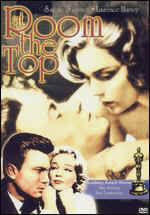 h. After
all, he had everything he could want –a steady job, the obligatory
binge in the pub at the
weekend and a nice girl friend. The
vague rage inside that there could be so much more and that it was
perhaps a life unlived was later echoed by James Dean in Rebel Without
a Cause. Rachel Roberts
is Finney's female counterpart and they both find solace in an illicit
sexual liaison which finds her eventually pregnant with a husband to
face.
Her performance is a tour-de-force suggesting a real life intimacy
with the subject matter. h. After
all, he had everything he could want –a steady job, the obligatory
binge in the pub at the
weekend and a nice girl friend. The
vague rage inside that there could be so much more and that it was
perhaps a life unlived was later echoed by James Dean in Rebel Without
a Cause. Rachel Roberts
is Finney's female counterpart and they both find solace in an illicit
sexual liaison which finds her eventually pregnant with a husband to
face.
Her performance is a tour-de-force suggesting a real life intimacy
with the subject matter.
Room
at The Top has Laurence Harvey as an angry young man with a precise
knowledge of his problems and a willingness to do something about it.
The problems arise when ambition turns into ruthlessness and
from then on it all starts going wrong.
Mind you, he gets to have an affair along the way with every
schoolboy's dream girl Simone Signoret which is not a thing to be
treated lightly.
The
educational ethos was still present in films such as
Far from The
Madding
Crowd
but with players such as Peter Finch, Terence
Stamp and Julie Christie nobody was complaining and even heavy dramas
such as D.H.Lawrence's
Women in Love was
acceptable mainly due to the presence of Glenda Jackson and Oliver
Reed.
And
just to reinforce the
changes that were taking place there was actually a British musical !
------ Oliver
made
by Carol Reed in 1968. The
inspired casting went a long way to making the movie into a class act
with Ron Moody superb as Fagin, Jack Wild the epitome of an Artful
Dodger, Shani Wallis as an appealingly pathetic tart - with -a -heart
and best of all Oliver Reed was evil incarnate dripping malevolence in
his wake accompanied by the no less malevolent Bullseye, his dog.
It had been a long time coming but this was great stuff from
the British cinema. At
long last the stars had roles they could get their teeth into and
“entertainment” had for once taken precedence over angst.
The
chequered history of British film continued and whenever David Lean
made a film it inevitably stood out from the rest.
After
Dr
Zhivago and
Lawrence
of Arabia I
was beginning to warm to David Lean after his aberrations with Celi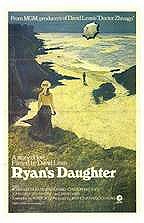 a
Johnson a
Johnson
and when
Ryan’s
Daughter
came along total redemption followed. Robert Bolt wrote the story, loosely based on and inspired by
Flaubert’s Madame Bovary, and David Lean turned it into
a magnificent film. Set
in the West of Ireland in 1916, the infamous Black and Tans are led by
a Major Doryean { Chris Jones } suffering from shell-shock which
manifests itself whenever Doryean is under stress.
Sarah Miles in possibly her best-ever role as Rosie Ryan falls
for the young Major and they have an illicit affair.
Illicit because Rosie is betrothed to Shaughnessy, the staid
and passionless schoolteacher played by Robert Mitchum who for once
gives some inkling of the actor that he could have been At first the role fits perfectly with Mitchum’s wooden
acting persona but he comes into his own later in the film when
Rosie’s infidelity comes to light and Mitchum reveals depths
previously rarely shown in his sympathy for her plight. Trevor
Howard is excellent trying to keep his recalcitrant flock in order but
John Mills stole in behind everybody and claimed the Oscar for his
portrayal of Michael, the village idiot.
If this film had been made today, there would have been naked
bodies writhing everywhere because “the audience demands it” I don’t think
the audience does demand it and neither did David Lean when he said ;
“To
suggest sex and leave it to the audience is much more erotic than
showing it all.
Sex
is imagination".
This
was great stuff and a breathless audience awaited more but Lean
chose to wait 16 years before making another film.
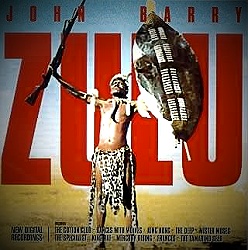 Things
became even better in 1964 when mine and many other people’s
favourite British film of all time burst onto the screen with
unprecedented impact. The Director was Cy Endfield and the film was Zulu.
The subject matter was the siege at Rorke’s Drift in 1879
when a 3,000 strong force of bloodthirsty Zulu warriors fresh from the
massacre at Isandhlawana were looking for fresh conquests.
The few hundred soldiers at the isolated settlement decided to
remain and fight a holding action rather than be caught out in the
open and the film concentrates on the ebb and flow of the battle in a
fascinating and realistic enactment of the action.
Michael Caine’s interpretation of a typical British officer
of the era is on the face of it a scathing representation of a
foppish, self-serving and class-ridden individual but as the film
unfolds his Gonville Bromhead’s anachronistic eccentricities and
depth of character become endearing.
This is quite an achievement particularly for such a young
actor because it would have been far easier to have stayed with a
one-dimensional cardboard
cut-out interpretation of the character.
Stanley Baker, playing the pragmatic
Lt. John Chard was the perfect foil for Caine while James Booth
was perfect as the cockney Henry Hook.
Richard Burton’s narration was similar to his voice-over on
War of the Worlds when his laconic and liquid tones carried far more
gravitas than some of the more hysterical narrations I have heard [
mostly American }. Things
became even better in 1964 when mine and many other people’s
favourite British film of all time burst onto the screen with
unprecedented impact. The Director was Cy Endfield and the film was Zulu.
The subject matter was the siege at Rorke’s Drift in 1879
when a 3,000 strong force of bloodthirsty Zulu warriors fresh from the
massacre at Isandhlawana were looking for fresh conquests.
The few hundred soldiers at the isolated settlement decided to
remain and fight a holding action rather than be caught out in the
open and the film concentrates on the ebb and flow of the battle in a
fascinating and realistic enactment of the action.
Michael Caine’s interpretation of a typical British officer
of the era is on the face of it a scathing representation of a
foppish, self-serving and class-ridden individual but as the film
unfolds his Gonville Bromhead’s anachronistic eccentricities and
depth of character become endearing.
This is quite an achievement particularly for such a young
actor because it would have been far easier to have stayed with a
one-dimensional cardboard
cut-out interpretation of the character.
Stanley Baker, playing the pragmatic
Lt. John Chard was the perfect foil for Caine while James Booth
was perfect as the cockney Henry Hook.
Richard Burton’s narration was similar to his voice-over on
War of the Worlds when his laconic and liquid tones carried far more
gravitas than some of the more hysterical narrations I have heard [
mostly American }.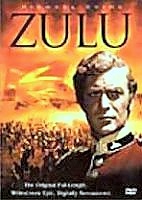
The
battle scenes are second to none with the fight in the hospital where
Hook won his V.C. the most exciting of all.
But just as nerve-wracking are the intervals between the action
when the ever diminishing force regroup time after time.
The Zulu warriors as individuals are truly scary but when the
waves of Zulu regiments appear filing over the veldt walking
increasingly faster until they break into a run and finally racing
forward with the battle cry Usuthu! the effect is electric.
Many
scenes are memorable but the one that stirs the blood is when the
formidable army of Zulus stand on the hillock ready to attack and
banging on their shields in unison chant Usuthu over and over again.
The fear in the ranks of the soldiers is palpable until the
largely Welsh regiment respond with a stirring rendition of Men of
Harlech.
I have seen this film many times and it stands as one of the most
exciting films of all time. Rorke’s
Drift has become legendary and whenever we watch such re-enactments of
historical events there is no doubt that each and every one of us
imagines ourselves on the field
of battle and always in some heroic role.
Zulu
was a difficult act to follow and sadly it was a one-off.
There are no British films after this that I can think of which
hold a candle to it. Cy
Endfield had set the standard and thrown down the gauntlet and nobody
has to date picked it up.
It has been said that the British press made much of this
battle in order to minimise the catastrophe which had taken place at
Isandhlwana a few hours earlier. Critics of the film are in a
minority but some have pointed out that the depictions of Hook, Chard
and Bromhead are incorrect. Whether this is true or not Zulu
remains the most exciting and authentic version of the battle that we
are ever likely to see. Cy Endfield received all the praise but Zulu owes a great deal to John Prebble's screenplay. Historian and author, Prebble has the knack of bringing history alive.
It’s
not true to say that things went downhill after that because many good
films have been and still are being made but British films always seem
to revert to the formulaic, family angst films to the exclusion of
adventure films when a healthy dose of each would be acceptable.
Michael Caine was naturally snapped up Hollywood but returned as the
drunken professor in the excellent Educating Rita
from the play by Willy
Russell. Originally set
in Russell’s home town of Liverpool, the film was shot in Dublin
because it was alleged to look more like Liverpool which has always
been a puzzle to me. Nevertheless,
Caine was brilliant in his role of a world-weary professor of English
Literature as was Julie Walters as Rita.
One of the main reasons we enjoy certain films is that we
identify with such and such a character and while a young girl would
never see herself behind the mealy-bags in Rorke's Drift there is many
a one who could identify with Rita. The number of people I have
met over the years who are not well-read or have a formal education but
are clever and quick in their own right is truly astounding and there is
surely a male variant of the Rita story waiting to be made.
Another
very similar film was Shirley Valentine
again by Liverpudlian
playwright Willy Russell which combined the classic combination of
humour and pathos to make an excellent “ I’m gonna do that just
as soon as I
leave the cinema" film.
A blow for freedom for bored housewives
everywhere, many identified with the heroine played by Pauline
Collins. The wry Scouse humour combined with the feisty housewife who escapes to
Mykonos and meets up with a handsome Greek
{ Tom Conti } struck a chord and this film has become a cult classic
in certain quarters -- one of them is our house.
There
are of course always the Bond films which started out quite well with
adaptations of Ian Flemings novels such as From Russia with Love
working very well but sadly the storylines have been superceded by the
so called special-effects and the whole thing has turned into a
caricature of what Fleming intended.
The
Day of The Jackal [1973 } was a
good example of which way we should be going with Edward Fox perfect
as the chilling assassin - in
fact Fox's assassin was far more in keeping with Fleming's
conception of Bond.
In many ways Producers often shoot themselves in the foot by making
films which they think the public want but in many cases the aficionado
of any given hero such as Bond want nothing more than a true
representation of how they see the character. Anyone who produced
a Bond with the quality of Jackal and the menace of Edward Fox would be
doing more of a service to the public and produce consistent quality
rather than the cartoon-like films that Bond has descended to.
But
for every film such as this there are too many lightweight things like
Notting Hill
which are simply vehicles for Hugh Grant to
pretend he is as good as Cary Grant.
The execrable
51st
State quite recently
plumbed the depths with Robert Carlyle’s Scouse accent deplorable
and a script written presumably while waiting for a bus.
Like so many before, the film exploited the stereotyped image of the
Liverpudlian as a loveable scally, threw in a Hollywood star, Samuel.
L. Jackson in a kilt and set up one or two so-called action scenes and
hoped there were enough geeks out there to make it pay. We and
they can all do so much better than that but it seems that
for every step forward there must be two steps back.
But
every now and then British cinema throws up a gem and they don't come
much better than the little known
East is East {
1999 }
Directed by
Damien O'Donnell
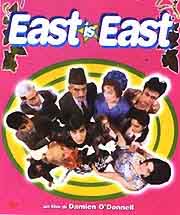 Set in Salford in the 1960's to a background of Enoch Powers
"Rivers of Blood" speeches, the film follows the misadventures
of an Anglo-Pakistani family with a white mother { Ella Khan } played
superbly by Linda Bassett and her traditionalist Pakistani husband { George Khan }
played brilliantly by Om Puri.
Set in Salford in the 1960's to a background of Enoch Powers
"Rivers of Blood" speeches, the film follows the misadventures
of an Anglo-Pakistani family with a white mother { Ella Khan } played
superbly by Linda Bassett and her traditionalist Pakistani husband { George Khan }
played brilliantly by Om Puri.
Advertisements of Enoch Powell speeches are a total irrelevance as the
whole family, like so many others, are too absorbed in attempting to
make something of their lives to have the time to take an interest in
the larger picture.
The central theme is George Khan's crusade to preserve Muslim values
within his family while living within a Northern English cultural
background. The opening scene where the Anglo-Pakistani children are
carrying the banners at the head of a Catholic parade while their father
returns from the Mosque sets the scene to perfection.
Most of the seven children whose ages range from early twenties down to
12 year old Sajid accept George's dictates when he's around but ignore
them when he's absent ----cooking bacon sandwiches, sneaking off to the
disco, tomboy Meenah playing football in the streets and so on. Ella and
the children have become as English as fish'n chips while George after
30 years in England is still attempting to live life as a Muslim father.
George's minor dictates are either flouted or carried out with a
grudging acceptance for the most part but when he moves into the world
of arranged marriages it is a step too far and the effect is cataclysmic
upon the whole family. Nazir jilts his arranged bride at the altar and
is disowned by his father who nevertheless presses on and arranges a
joint marriage for two of his other sons.
The film is essentially a comedy and is hilariously funny but like all
good comedy it has a poignant counterpoint underscored by one scene in
particular when George gives Ella a hiding. This scene is extremely
brutal but totally in keeping with George's vision of how a Muslim
father should act in order to retain order within his family.
Linda Bassett's Ella deserves a special mention as she carries on
working in the chip shop and soldiers on in order to keep body and soul
together while George plays the Muslim patriarch. Ella is identifiable
with legions of Northern working class women who do the same thing in
many different circumstances ----women work, men play.
The whole cast are superb and like it's writer and director they appear
to have had first hand knowledge of their subject.
As a comedy the film is unreservedly successful but it examines and
dissects racism, hypocrisy, integration, immigration and humanity in a
very perceptive and potent manner. The comedic overlay is not there to
soften the impact but only serves to emphasise that this film is a
serious study of Northern working-class life in the 1960's which is
possibly more relevant today than it was then.
Typically, the film is little known and was poorly advertised and the
poster appears to have been thrown together as an afterthought.
The film has a cult following simply because it has only become known by
word of mouth.
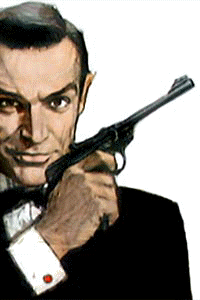 Overall,
while things are far from perfect on the British cinema front
they are still a far cry from Public school propaganda movies but
nevertheless our actors and actresses continue to defect as they have
always done. The reasons
why they invariably head for Hollywood are financial of course but
there is no doubt that there is a greater choice of script usually
tailored to meet any given actors particular attributes.
From the days of David Niven our finest stars have headed west
and who can blame them when they end up in fine movies which showcase
their skills and lead on to even better things. Overall,
while things are far from perfect on the British cinema front
they are still a far cry from Public school propaganda movies but
nevertheless our actors and actresses continue to defect as they have
always done. The reasons
why they invariably head for Hollywood are financial of course but
there is no doubt that there is a greater choice of script usually
tailored to meet any given actors particular attributes.
From the days of David Niven our finest stars have headed west
and who can blame them when they end up in fine movies which showcase
their skills and lead on to even better things.
Daniel
Day Lewis, Anthony Hopkins, Sean Connery, Robert Shaw, Richard Harris,
Madeleine Stowe, Oliver Reed, Jude Law and so many more are all actors
and actresses who have that indefinable charisma which can convey so
much with a twitch of an eyebrow or a tilt of the head and they are
all making films which are both meaningful and entertaining.
Those two words should be engraved over what remains of the
British film studios and perhaps one fine day the tide will turn.
But the world is ever-changing and it is more and more difficult to
define what is a "British" film when British actors are
commonly seen in Hollywood movies, American stars play essentially
British roles and British technicians are common to American
films. Unlike continental films which retain their unique status
simply by reason of language and are instantly recognisable as French
cinema or Polish cinema or Spanish cinema and so on, British film has
like so much else of our culture for better or for worse melded with
American filming and in the process lost its identity completely.

|
